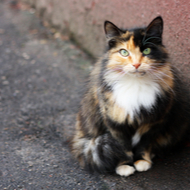
Research shows there are more unowned cats residing in densely populated areas.
Almost 250,000 stray cats are thought to be living in urban areas of the UK, according to a new study.
Researchers from Cats Protection collected sightings of stray cats from 3,101 resident surveys and 877 reports. The reports were taken across five urban areas – Bradford, Beeston, Bulwell, Dunstable & Houghton Regis, and Everton.
The team added these sightings to 601 confirmed locations from Cats Protection's community teams and incorporated them into a population model. The model revealed that more stray cats live in the most densely populated and deprived areas.
Through these results, the team worked out that the total number of unowned urban felines in the UK stands at 247,429. Their findings are published in the journal Scientific Reports.
“Up to now, there haven’t been any evidence-based estimates of the number of stray and feral cats in the UK,” commented Dr Jenni McDonald, feline epidemiologist for Cats Protection and lead author of the research.
“It has previously posed a challenge in part because of problems accurately distinguishing owned from unowned cats. However, our population-modelling methodology offers a solution by combining valuable data from residents with confirmed sightings, which gives us a robust means to study unowned cat populations nationally.
She added: “This is a major step towards understanding the true scale of the feral and stray cat population in the UK.”
Unowned cats are of particular welfare concern as they are unneutered, and populations can expand rapidly.
Cats Protection's study found that the number of unowned cats varied widely across localised areas. However, most were in densely populated areas - improving the charity's understanding of where cats may be most in need.
“We support these sorts of communities by neutering and finding homes for friendly unowned cats," explained Jane Clements, Cats Protection’s head of neutering.
“If any cats aren’t suited to becoming domestic pets, then we neuter them too and give residents the means to look after them in their community, such as providing materials and designs to build cat shelters.
“Engaging communities is the key to ensuring that all cats are cared for in a long-term and sustainable way, and this research will enable us to take our Cat Watch programme to the areas of greatest need.”



 The latest
The latest